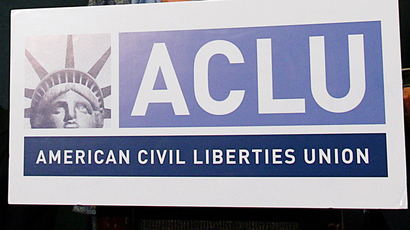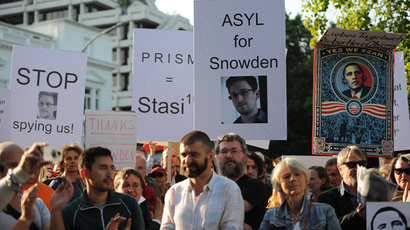NSA plans to expand collection of American phone metadata

Lawsuits waged at the United States government over the National Security Agency’s controversial phone data collection program may actually cause the NSA to hold onto information even longer, a new report reveals.
A handful of lawsuits have been filed against the US government and the administration of President Barack Obama since last June when former intelligence contractor Edward Snowden revealed that the NSA has been routinely compelling the nation’s telecommunications companies for the metadata pertaining to millions of Americans. Pres. Obama has since submitted to calls for reforming that program, and even instructed Congress recently to find an alternative approach to storing metadata. According to the Wall Street Journal, however, the NSA may have to hold onto that data for a little bit longer.
On Wednesday this week, WSJ journalists Devlin Barrett and Siobhan Gorman wrote that that the lawsuits filed against the Obama administration over the NSA program may cause some rather unintended consequences to occur. Because the NSA may have to argue those cases in court, they wrote, any intelligence it collected that pertains to the plaintiffs may have to be retained indefinitely pending trial.
Currently, the NSA is obligated to purge metadata from its systems after about five years. Speaking to the Journal, one official said on condition of anonymity that those records are removed from the database about twice a year.
But because those records may become evidence in the lawsuits, the paper alleged, the NSA may be forced to postpone a data purge until after the federal courts consider the cases against the bulk metadata collection program.
“A particular concern, according to one official, is that the older records may give certain parties legal standing to pursue their cases, and that deleting the data could erase evidence that the phone records of those individuals or groups were swept up in the data dragnet,” Barrett and Gorman wrote.
An attorney with one of those plaintiffs that have sued the administration over the NSA program — Patrick Tommey of the American Civil Liberties Union — told the Journal that "It's difficult to understand why the government would consider taking this position, when the relief we've requested in the lawsuit is a purge of our data.”
But Cindy Cohn, a lawyer and legal director for co-plaintiffs at the Electronic Frontier Foundation, acknowledged to the paper, “If they're destroying evidence, that would be a crime.”
Both the ACLU and EFF filed lawsuits against the administration within days of Mr. Snowden’s first major NSA revelation last June. The EFF has been fighting against the NSA’s alleged spy programs since 2008 when it challenged the government’s "illegal and unconstitutional program of dragnet communications surveillance” on behalf of a former AT&T customer. When Snowden’s early June leak showed that telephone lines administered by competitor Verizon were being sent to the NSA, though, the ACLU again filed suit.
“As an organization that advocates for and litigates to defend the civil liberties of society's most vulnerable, the staff at the ACLU naturally use the phone — a lot — to talk about sensitive and confidential topics with clients, legislators, whistleblowers and ACLU members,”ACLU legal fellow Brett Kaufman wrote when the suit was filed. “And since the ACLU is a VBNS [Verizon Business Network Services] customer, we were immediately confronted with the harmful impact that such broad surveillance would have on our legal and advocacy work.”
After the Verizon revelation, the EFF’s Cohn told the Washington Post that the NSA leaks had been a “tremendous boon” to previously filed legal challenges. Speaking to the Journal this week, though, she said the issue should have been brought before the courts long ago.
"I think they're looking for any way to throw rocks at the litigation," she said. "To the extent this is a serious concern, we should have had this discussion in 2008."














